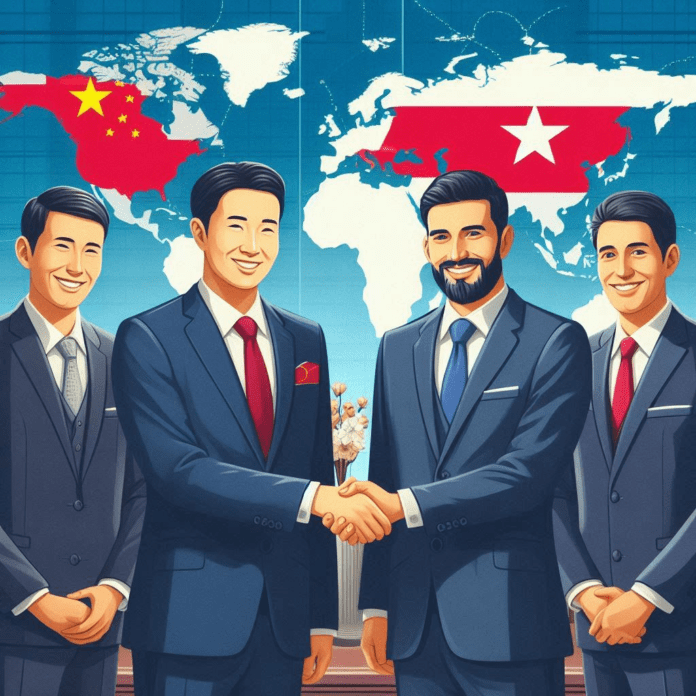China’s strategy of using economic influence to gain political footholds is becoming increasingly evident, particularly in Costa Rica. This small Central American nation has maintained the longest-standing diplomatic relations with China among its peers, with ties dating back to 2007.
Huawei’s Influence and Cybersecurity Concerns
Costa Rica’s experience with Chinese investment has also exposed vulnerabilities in its national security, particularly concerning cybersecurity. In response to these concerns, President Rodrigo Chaves approved a decree banning companies from countries that have not signed the Budapest Cybercrime Convention from participating as 5G providers in Costa Rica. This move effectively barred Huawei, a Chinese state-owned telecom giant, from securing 5G contracts in the country.
China did not take this decision lightly. The Chinese embassy in Costa Rica quickly condemned the decree, hinting at potential economic repercussions for the bilateral relationship. Huawei’s failed appeal to Costa Rica’s Constitutional Court only intensified Beijing’s efforts to influence Costa Rican officials. The Chinese government allegedly turned to the Internal Workers’ Front of the Costa Rican Institute of Electricity (ICE), a state-run service provider, to pressure the government into reversing the ban. ICE’s appeal to a lower court has put the decision on hold, pending further evidence.
China’s Veiled Warning to US; Threat Looms Over $3.6 Billion Chancay Port
This situation took a darker turn in April when Huawei was exposed for hosting an exclusive, confidential party for at least seventy ICE employees at the Hilton La Sabana in San José. Reports indicated that a Huawei accounts manager was seen mingling closely with the Costa Rican official responsible for managing public contracts, raising serious concerns about corruption and conflict of interest. Following the exposure of these events, several unions affiliated with ICE filed complaints, leading to the firing of at least one ICE official involved in the scandal. The incident sparked a public exchange of accusations between President Chaves and the Chinese Embassy, further straining relations.
The Lure of Investment and the Cost of Corruption
The promise of significant investment accompanied the establishment of these relations, and initially, the prospects seemed promising. A prime example is the $100 million investment in a new stadium in San José, which opened its doors in 2011.
However, beneath the surface of these grand promises lies a troubling pattern of manipulation and coercion. Take, for instance, the Recope Oil Refinery project announced in 2007, which was intended to upgrade Costa Rica’s energy infrastructure. The project encountered numerous delays and was ultimately canceled in 2016 due to reported breaches of agreement by the China National Petroleum Corporation. This cancellation highlights the fragile nature of such agreements and the risks associated with depending on Chinese investments.
Another significant example of failed Chinese projects in Costa Rica is the expansion of Highway 32 by the China Harbor Engineering Company. Commissioned in 2017, the project was expected to be completed by 2020 but remains incomplete. The delays have been compounded by reports of poor design, dangerous conditions for civilians, and widespread corruption. These failures have left Costa Rica questioning the true value of its partnership with China.
China Expands Spy Base in Cuba; US Alarmed by Growing Espionage Challenge
A Broader Pattern of Coercion and the Role of the USA
Costa Rica’s experiences with China are far from isolated incidents. Across Latin America, similar stories of failed Chinese investments, corrupt influence-buying, and economic coercion are becoming increasingly common. For instance, in Argentina, China has used its holdings of Argentine debt and threats to disrupt infrastructure projects to undermine the government of President Javier Milei. Beijing’s influence extends even to Argentina’s sovereignty over a Chinese-controlled space base operated by the Chinese military, illustrating the far-reaching impact of China’s subversive tactics.
China’s Backdoor Data Infiltration: A Growing Concern for Global Security
The broader pattern is clear: when Beijing’s economic interests are threatened, it responds with massive political and economic pressure. This shift in China’s engagement in Latin America should serve as a wake-up call for the United States. While providing alternative economic opportunities to Beijing’s investments remains essential, it is equally important for Washington to support regional governments in resisting China’s coercive tactics.
The United States possesses the tools necessary to counter China’s influence in Latin America, including targeted restructuring deals aimed at Chinese debt and support for detecting and investigating money laundering and corruption tied to Beijing. As Latin American countries increasingly recognize the risks of Chinese engagement, Washington has a unique opportunity to reclaim its position as the region’s preferred partner.
Bold but Controversial: China’s Stealth Entry into US EV Market via Morocco
Costa Rica’s experience with China underscores the need for vigilance and strategic action. The lessons learned from these encounters serve as a stark warning not only to regional governments but also to the United States. As China’s true nature as a coercive and subversive political actor becomes more apparent, the importance of offering a robust and reliable alternative to Beijing’s influence cannot be overstated.


